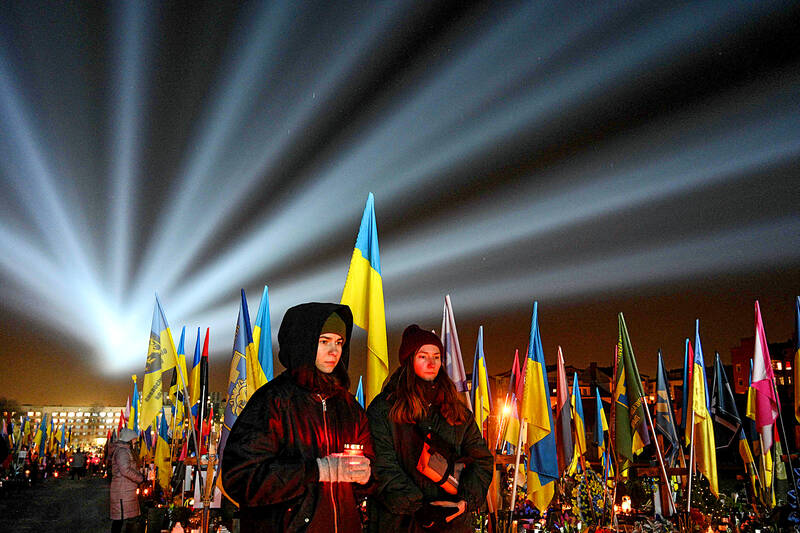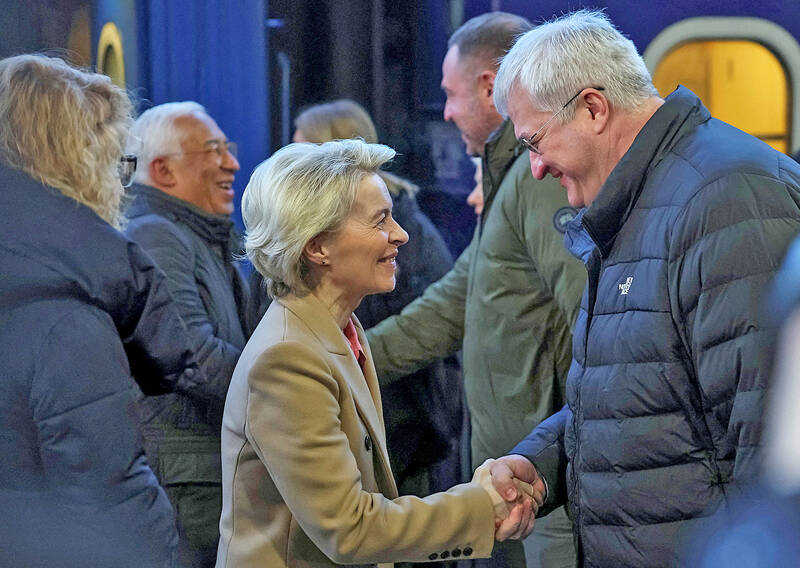A dozen leaders from Europe and Canada yesterday visited Ukraine’s capital to mark the third anniversary of Russia’s invasion in a show of support for Kyiv by some of its most important backers.
European Commission President Ursula von der Leyen and Canadian Prime Minister Justin Trudeau were among the visitors greeted at the railway station by Ukrainian Minister of Foreign Affairs Andrii Sybiha and the president’s chief of staff Andrii Yermak.
Von der Leyen wrote on social media that Europe was in Kyiv “because Ukraine is in Europe.”

Photo: AFP
“In this fight for survival, it is not only the destiny of Ukraine that is at stake. It’s Europe’s destiny,” she wrote.
The guests, also including European Council President Antonio Costa as well as the prime ministers of northern European nations and Spain, were set to attend events dedicated to the anniversary and discuss supporting the nation with Ukrainian President Volodymyr Zelenskiy amid a policy shift by Washington under US President Donald Trump.
In the latest sign of Europe’s efforts to rework its strategy on Ukraine to respond to Trump’s actions, Costa on Sunday announced that he would convene an emergency summit of the 27 EU leaders in Brussels on March 6, with Ukraine at the top of the agenda.

Photo: Reuters
“We are living a defining moment for Ukraine and European security,” Costa wrote on social media.
The three-year mark of the war in Ukraine came at a sensitive moment for Kyiv as Zelenskiy navigates a rapidly changing international environment upended by Trump’s changes to the US approach to the war.
Trump has sought to follow through on his campaign promises to end the war quickly, although his methods for doing so have alarmed many in Ukraine and Europe, who believe that his approach is too conciliatory toward Russia and Russian President Vladimir Putin.
The Russian Ministry of Foreign Affairs on Saturday said that preparations for a face-to-face meeting between Trump and Putin were underway, and US officials have said that they had agreed with Moscow to re-establish diplomatic ties and restart economic cooperation.
Russian Deputy Minister of Foreign Affairs Sergei Ryabkov on Sunday told TASS news agency that Moscow and Washington would continue bilateral talks at the end of next week, adding that “quite a lot” of contact was ongoing.
Leaders across the EU, fearing both that Trump’s approach to Ukraine would lead to an unfavorable settlement for Kyiv and that they — among Ukraine’s most important supporters — would be sidelined in negotiations for peace, have rushed to assert their own response to the rapidly shifting environment.
EU High Representative for Foreign Affairs and Security Policy Kaja Kallas yesterday said that the US cannot seal any peace deal to end the war without Ukraine or Europe being involved.
She highlighted what she claimed were pro-Russian positions being taken up by the Trump administration.
“You can discuss whatever you want with Putin, but if it comes to Europe or Ukraine, then Ukraine and Europe also have to agree to this deal,” Kallas told reporters in Brussels, where she was chairing a meeting of EU foreign ministers.
Kallas travels to Washington today for talks with US Secretary of State Marco Rubio.
Asked whether the US administration is acting in the interests of Russia or Ukraine’s Western backers, she said: “If you look at the messages that come from the United States, then it’s clear that the Russian narrative is there very strongly represented.”
Kallas rejected Trump’s earlier assertion that Zelenskiy was a dictator for not having held elections after his term expired last year, saying: “Russia hasn’t had elections in 25 years.”
Ukrainian law prohibits elections being held while martial law is in place, and Zelenksiy on Sunday said that after martial law is lifted “there will be elections and people will make their choice.”

The Burmese junta has said that detained former leader Aung San Suu Kyi is “in good health,” a day after her son said he has received little information about the 80-year-old’s condition and fears she could die without him knowing. In an interview in Tokyo earlier this week, Kim Aris said he had not heard from his mother in years and believes she is being held incommunicado in the capital, Naypyidaw. Aung San Suu Kyi, a Nobel Peace Prize laureate, was detained after a 2021 military coup that ousted her elected civilian government and sparked a civil war. She is serving a

REVENGE: Trump said he had the support of the Syrian government for the strikes, which took place in response to an Islamic State attack on US soldiers last week The US launched large-scale airstrikes on more than 70 targets across Syria, the Pentagon said on Friday, fulfilling US President Donald Trump’s vow to strike back after the killing of two US soldiers. “This is not the beginning of a war — it is a declaration of vengeance,” US Secretary of Defense Pete Hegseth wrote on social media. “Today, we hunted and we killed our enemies. Lots of them. And we will continue.” The US Central Command said that fighter jets, attack helicopters and artillery targeted ISIS infrastructure and weapon sites. “All terrorists who are evil enough to attack Americans are hereby warned

Seven wild Asiatic elephants were killed and a calf was injured when a high-speed passenger train collided with a herd crossing the tracks in India’s northeastern state of Assam early yesterday, local authorities said. The train driver spotted the herd of about 100 elephants and used the emergency brakes, but the train still hit some of the animals, Indian Railways spokesman Kapinjal Kishore Sharma told reporters. Five train coaches and the engine derailed following the impact, but there were no human casualties, Sharma said. Veterinarians carried out autopsies on the dead elephants, which were to be buried later in the day. The accident site

‘NO AMNESTY’: Tens of thousands of people joined the rally against a bill that would slash the former president’s prison term; President Lula has said he would veto the bill Tens of thousands of Brazilians on Sunday demonstrated against a bill that advanced in Congress this week that would reduce the time former president Jair Bolsonaro spends behind bars following his sentence of more than 27 years for attempting a coup. Protests took place in the capital, Brasilia, and in other major cities across the nation, including Sao Paulo, Florianopolis, Salvador and Recife. On Copacabana’s boardwalk in Rio de Janeiro, crowds composed of left-wing voters chanted “No amnesty” and “Out with Hugo Motta,” a reference to the speaker of the lower house, which approved the bill on Wednesday last week. It is